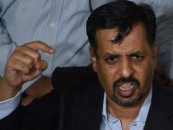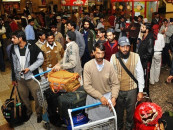IIOJK: restoration of statehood
Kashmir's special status debate resurfaces as political tensions rise, exposing the challenge of Indian rule.

The resolution adopted in the Illegally Indian Occupied Jammu and Kashmir (IIOJK) Assembly on 7th November, demanding restoration of the special status of the disputed state, has once again brought to the fore the inherent fissures that have challenged Indian rule for over seven decades. Denial of the existence of a real problem in the occupied state has not brought any respite to the successive governments in India despite many tricks applied in luring the Kashmiri people through the pliable Kashmiri leadership.
Media reports suggest a scuffle broke out in the occupied state assembly between the opposition Bhartiya Janata Party (BJP) and the ruling National Conference (NC) and Indian National Congress alliance. At the centre, the BJP also condemned the resolution, calling it an attempt to "wage a war against the Indian constitution" and accused the alliance of supporting "terrorists and separatists". BJP leader and former Union Minister Smriti Irani said that the passage of the resolution seeking special status was an "attempt to divide India". She asserted that the "abrogation of Article 370, passed by parliament, will not be restored".
Not long ago, Prime Minister Modi boasted about the "people's belief in democracy" while referring to elections in the occupied state after a gap of ten years. However, the resolution by the occupied state's assembly demanding the restoration of the state's special status has turned out to be a red rag to the Modi government and his BJP. Regarding the resolution, Mr Modi said he had "buried the wall of Article 370 in the graveyard". He added: "Those dreaming of getting Article 370 status restored should be mindful that the decision to revoke the (occupied) region's special status was not an ordinary decision, and no power in the world can undo it."
The IIOJK assembly elections were showcased as the success of the Modi government's Kashmir policy and the confidence it gained by assimilating the entire state in India. The BJP used to ridicule its rivals for appeasing the Kashmiris by granting them "special status", while Modi had actually merged the occupied state in India. However, the election of the occupied state came as an utter disappointment for Mr Modi when the BJP could not win a single seat in the Muslim-majority Kashmir valley.
Mr Modi's refusal to restore the statehood status of IIOJK is understandable for multiple reasons:
First, it would go against the RSS' known policy of establishing Hindu supremacy for which revocation of Articles 370 and 35-A was always a part of their election manifestos.
Second, Mr Modi, riding on a two-thirds majority in Lok Sabha, revoked these articles in 2019 to create an impression that the BJP is a party of action and has the will to take action that can project India as a powerful state.
Third, revoking Kashmir's statehood and bringing it under the Lieutenant Governor means the Union Home Ministry would control the state. Again, it suits the BJP to control the occupied state even if it may not rule it. Simultaneously, it can project its Hindutva image and garner support in the rest of the country.
The pro-India Kashmiri politicians are faced with the dilemma of maintaining their hold on the electorate. The NC-INC alliance may have formed the government in the erstwhile state with promises to restore the statehood. Still, it will be pitted against the BJP's fierce resistance despite the passage of a resolution in the state assembly. In Indian national politics, any move by the NC-INC to revoke Articles 370 and 35-A would be projected by the BJP-RSS conglomerate as "treason" in a country already reeling under religio-cultural apartheid since the coming into power of Mr Modi, if not earlier. Undoubtedly, the BJP-RSS duo would make it an election plank to question the patriotism of the NC-INC alliance.
There are multifaceted challenges the NC-INC combine faces while governing the occupied state:
First, implementing their election manifestos' demand for the restoration of statehood to the occupied state would be a tall order due to the Home Ministry's direct rule over the state. Hence, the Modi government can always sabotage any attempts by the pro-India Kashmiri politicians to revert the state's status to its pre-August 2019 position.
Second, the current situation in the occupied state hardly gives any confidence to the people because of strict censorship, internet and social media jamming and thousands of arbitrary arrests, including children.
Third, IIOJK's current status under the Lieutenant Governor's rule is no more than a municipality, while Mr Omar Abdullah may continue to boast himself as a chief minister. Therefore, expecting a substantive change in the status of the occupied state would be asking too much, especially if it's going back to pre-August 2019 status.
Fourth, the major test for the Kashmiri politicians would be to challenge the Modi government's attempts to change the demography of the occupied state from a Muslim-majority state to a Hindu-majority state by issuing Kashmir domiciles to people from outside the state.
The classic carrot and stick policy to keep the state under Indian occupation by force always faced resistance from the Kashmiri people despite detentions and coercion. The challenge of winning the Kashmiri hearts and minds remains elusive to date. RSS-led Hindutva dispensation has further alienated the Kashmiris after the revocation of Articles 370 and 35-A of the Indian constitution. India has tried to bypass Pakistan but failed. In such a situation, looking for a political solution between Pakistan and India assumes far greater importance than pushing the issue under the carpet. Otherwise, the people of both countries would be condemned to suffer.
















COMMENTS (1)
Comments are moderated and generally will be posted if they are on-topic and not abusive.
For more information, please see our Comments FAQ